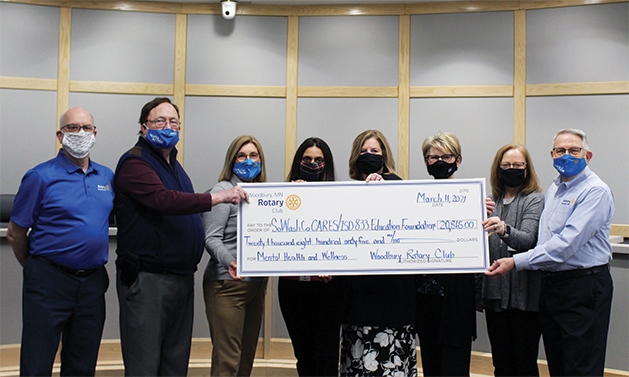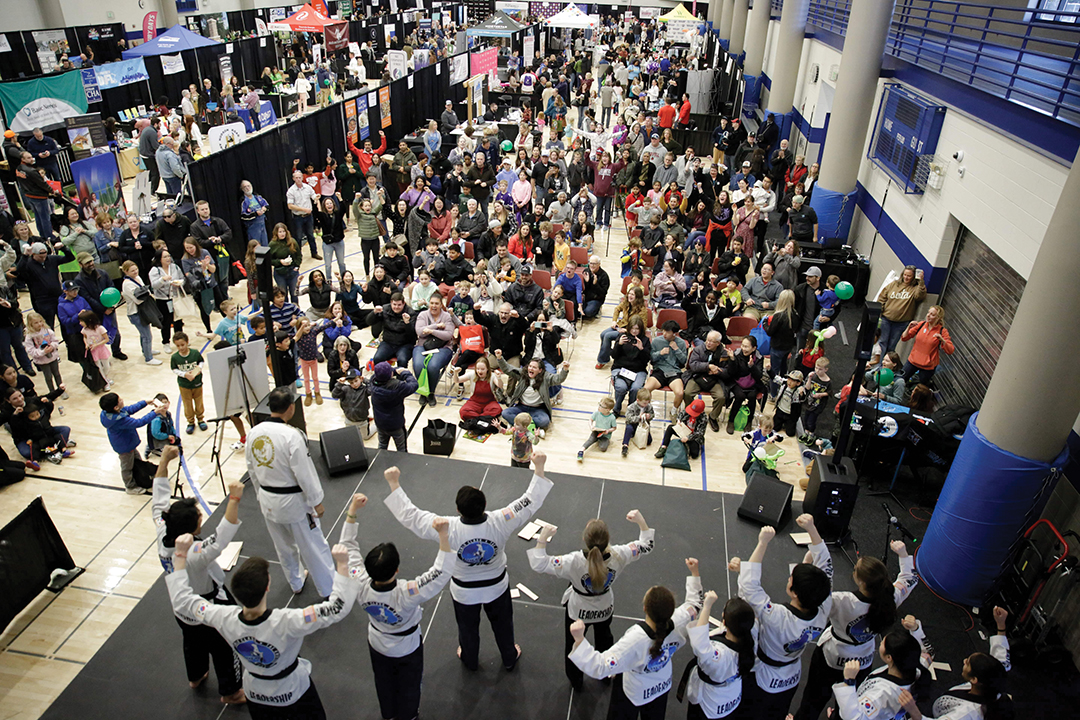
PHOTO BY: SOWASHCO CARES
South Washington County Schools receive a grant dedicated toward student mental health.
“Mental health has really become a basic need. It’s a foundation for kids being able to learn,” says Cheryl Jogger, South Washington County Schools community engagement coordinator and founder and chair of the South Washington County Community Action Reaching Every Student, or SoWashCo CARES, board.
According to the National Alliance on Mental Illness, also known as NAMI, one out of six children ages 6–17, or 16.5 percent, experience a mental health disorder in 2016. For students in Minnesota, that number is slightly higher—according to the Minnesota Department of Health, in 2016 one in five students showed signs of depression.
For South Washington County Schools, mental health has always been a priority, especially given the circumstances surrounding COVID. “Many students and families are struggling more due to the pandemic,” Jo Park, special services supervisor, says.
In March of this year, the Woodbury Rotary Club raised funds for student mental health in the district. All-in-all, the club raised $20,865 for SoWashCo CARES through several primary sources of funding, including through community citizens and organizations, other Rotary Clubs and the Rotary District matching grant.
Woodbury Rotary Club members Alan Henaman, director of public image, and Larry Propst, director of grants applications, say the relationship between the Rotary Club and SoWashCo CARES has been strong through the years; so, donating toward these efforts was the clear choice.
“We wanted to become more involved with the school district, since it was such a direct link to the youth in [South Washington] County,” Henaman and Propst say. “And the best was to do this was through SoWashCo CARES …”
Prior to the nearly $21,000 grant, the Rotary Club initiated a mental health program with SoWashCo CARES in February 2020, where $2,500 was donated to the program. When the Rotary Club learned the program needed additional funding, the club stepped up to the plate.
The grant is being allocated toward mental health services, mindfulness tools and supply training for district staff. “The training is for clinical social workers to increase their skills and give them more tools in their tool bag,” Park says. The two classes include social thinking—understanding how we think and express ourselves with other people—and yoga calm—moving your body to reduce stress, increase attention and engage your brain.
Grant and wellness coordinator Jodi Witte says student mental health has been an ongoing concern for the district. “We’ve heard for years that some kids would fall through the cracks, and sometimes that was due to financial issues, but sometimes they just needed more support, help and treatment,” she says. “We worked at it, and that’s when the Rotary Club stepped up …”
“Basically, there was no reason for us to do anything other than support additional programs and services [that] SoWashCo CARES could develop.” Henaman and Propst say. “They are, and will continue to be, very successful and insightful about what is needed.”
Witte explains that bettering student mental health begins with understanding what the needs are, and Park agrees, noting how finances play a large role.
“Students may lack transportation, or their lives are too busy—students with families who work at night [or] households where students have other commitments—to receive therapy outside of school and it’s hard to consistently go to therapy,” she says. That is where the districts three community agency partners, the Youth Service Bureau, Family Innovations and Ellie Family Services, step in.
“[Those partners] are providing therapists in our schools, so we can support kids right within the school day,” Park says. “Students are allowed to attend therapy during the school day [and] receive support and function better and access learning easier.”
To assist with financial burdens, a large sum of the Rotary Club grant is going toward families who are unable to access therapy. With the grant, the district can assist families with filling out paperwork, learning how to apply to programs, referrals and help find insurance.
“So many social and mental health issues in our schools is where ground zero is. We don’t usually have funds to help directly, but this is pulling our community together to work with providers and fill the gaps,” Witte says. “… That’s the really important piece here. When we come out of this, in some capacity, we can better serve our kids and understand their needs.”
Regarding SoWashCo CARES programs, Jogger says, “All programs are community driven, student-centered and designed to help the district help the students. It’s our community helping our community.”
By the Numbers
Having a mental health condition makes it challenging to live everyday life—and can be especially challenging for students balancing schoolwork, sports, clubs and more. These numbers, reported by the National Alliance on Mental Health (NAMI), show that no one is alone in their mental health battle.
• 16.5 percent of youth (ages 6–17) experience a mental health condition.
• 50 percent of all lifetime mental illness begins by age 14.
• 51 percent of youth with a mental health condition get treatment.
• High school students showing signs of depression are twice as likely to drop out compared to peers.
• Youth with mental, emotional or behavioral conditions are three times as likely to repeat a grade.
Community Connections
Members of the Woodbury Rotary Club have donated their time, energy and financial funds towards bettering our community. Henaman and Propst say many of their projects have been focused on making the community a better place for youth and families; projects include:
• Installing Buckle Up for Safety signs at school parking lots.
• Sponsoring students to attend the Rotary Youth Leadership Academy.
• Contributing $5,000+ to The First Tee at Eagle Valley.
• Sponsoring the Woodbury High School Robotics Team.
• Raising $46,000+ to install the Woodbury Rotary Fishing Pier and Playground at Powers Lake.
• Raising $236,000 to develop the Woodbury Rotary Miracle Field at Jeff Hanson Memorial Baseball Park.






















